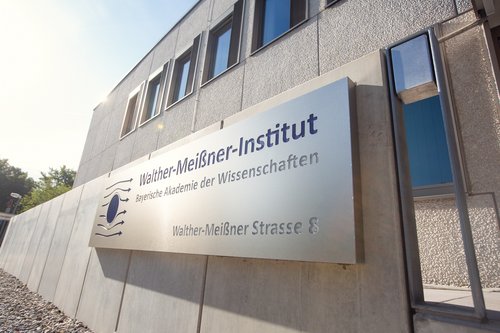About us
Mission statement
The Walther-Meißner-Institute for Low Temperature Research (WMI) is a research institute of the Bavarian Academy of Sciences and Humanities (BAdW). It conducts fundamental and applied research in the field of low and ultra-low temperature physics with special focus on quantum systems, quantum computing, superconductivity and correlated electron systems, as well as magnetism and spintronics. It also develops low and ultra-low temperature methods, measurement techniques for characterizing quantum systems and matter at extreme conditions, as well as method for the growth of single crystals and thin film heterostuctures of quantum matter. The WMI also operates a helium liquefier and supplies liquid helium to both Munich universities.
Historical Roots

The historical roots of WMI go back to Walther Meißner who founded the "Commission for Low Temperature Research" in 1946 when he was president of BAdW (1946 - 1950). The first research activities then were started in 1946 in the Herrsching barracks. After the retirement of Walther Meißner in 1952, Heinz Maier-Leibnitz, who followed Walther Meißner on the Chair for Technical Physics of the Technical University of Munich (TUM), became the new head of the Commission for Low Temperature Research. In 1967, the commission moved to the Garching research campus after the construction of the new "Zentralinstitut für Tieftemperaturforschung (ZTTF)" was completed. Until 1972, the theory group of the Institute Laue Langevin was hosted at the ZTTF. In 1980, Prof. Dr. Klaus Andres became the new director of the ZTTF followed by Prof. Dr. Rudolf Gross in 2000, again associated with the Chair for Technical Physics (E23) at the Physics Department of TUM. In 1982, the ZTTF was renamed into Walther-Meißner-Institute for Low Temperature Research (WMI) on the occasion of Walther Meißner's 100. birthday.
In 2019, the governance structure of WMI was changed from a single director to a board of up to three scientific directors headed by a managing director. Already in June 2020, Prof. Dr. Stefan Filipp started as the second scientific director of WMI with strong focus on superconducting quantum computing. He also was appointed full professor - Chair for Technical Physics (E23) - at TUM. In January 2023, Prof. Dr. Peter Rabl joined WMI as the third scientific director with focus on theoretical quantum physics. He has been appointed full professor - Chair for Applied Quantum Theory - at TUM.
The individual research groups of WMI offer attractive research opportunities for bachelor, master and Ph.D. students, as well as postdoctoral fellows.
